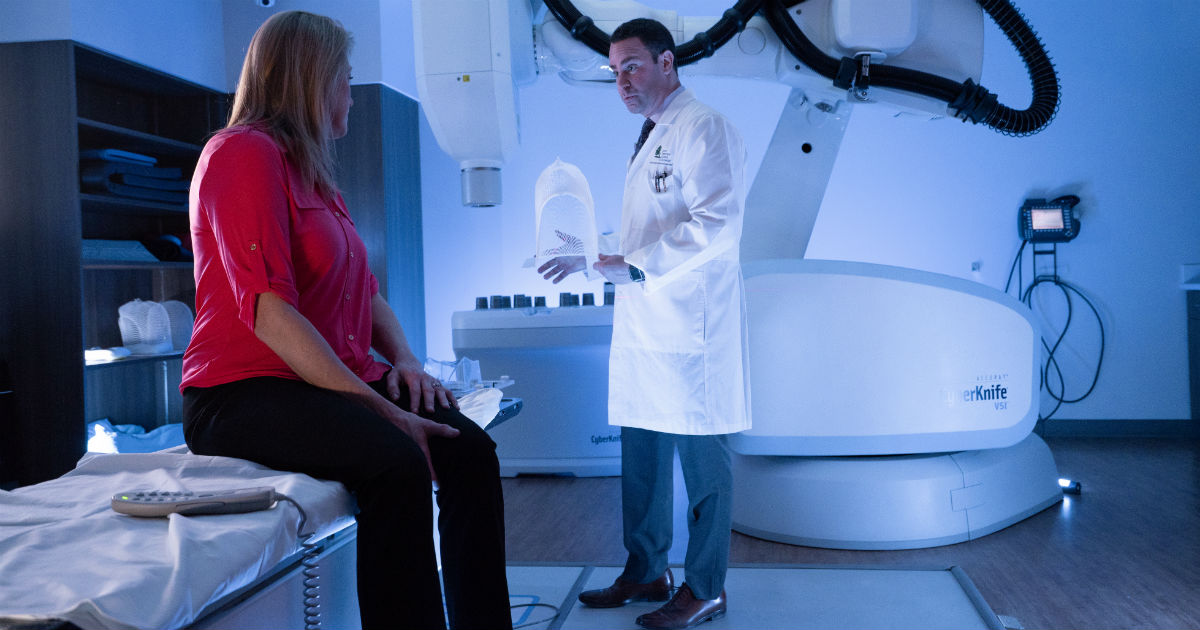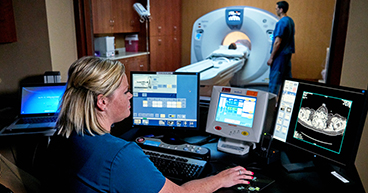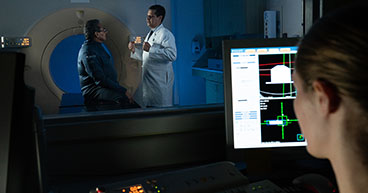
If you notice changes to your skin during or after radiation therapy, you are not alone. Skin irritation, such as redness or sensitivity, in the treated area, is one of the common side effects of radiation therapy. Your skin may also become dry, itchy or moist. These and other changes may be uncomfortable and upsetting. But advances in radiation oncology have produced technologies designed to help reduce the side effects of radiation therapy. And knowing what to expect before your radiation therapy may help reduce some of the discomfort the treatment may cause.
What is radiation therapy?
Radiation therapy is the use of high-energy radiation or radioactive substances to shrink or kill cancer cells. Radiation may be part of the treatment plan for many types of cancer including lung cancer, breast cancer, prostate cancer and lymphoma. Radiation therapy may come from a machine outside the body via radiation beams or x-rays (external radiation), or from radioactive material placed directly into or near a tumor inside the body (internal radiation).
When radiation passes through the skin, the healthy cells in the treatment area may become damaged. If you receive frequent radiation, your skin cells often do not have enough time to repair and regenerate in between treatments. Radiation therapy may cause the exposed skin to peel off faster than it may grow back, causing sores and, in rare occasions, ulcers to develop.
Types of skin reactions
Radiation-induced skin reactions may progress from erythema (redness), to desquamation (shedding of outer skin layers), and sometimes to ulceration. During the first week or two of radiation treatment, you may notice a faint redness and your skin may become itchy or tender. After three to four weeks, your skin may become dry and peel, or you may notice moist areas. Later effects of radiation may include darkening or thinning of the skin.
The following are some possible side effects that may occur on radiated skin:
- Rash, redness, sunburn-like appearance
- Itching (pruritus), flaking, scaling
- Tenderness, discomfort, pain, burning
- Dry mouth or mouth sores
- Dryness, peeling
- Radiation burns
- Moist (weeping) areas, oozing
- Swollen, puffiness and soreness
- Infection
- Increased sensitivity to sunlight
Who experiences skin reactions?
Radiation-induced skin reactions vary, depending on the type of radiation, the length of the treatment, the amount of radiation, the part of the body being treated, skin type, and other factors.
For instance, skin irritation is more likely to occur in the part of the body where the skin is thin and smooth, such as the face or neck, or where you have folds, including the breast, buttocks, abdomen, armpit or groin. In addition, skin reactions tend to occur more often if you have received a high dose of radiation, a single radiation beam, or chemotherapy shortly before or during radiation therapy.
Additional risk factors for radiation-induced skin reactions may include:
- Skin cancer, breast cancer, anal cancer, vulvar cancer, or head and neck cancers
- Compromised skin integrity, such as scars or lesions
- Compromised lymph drainage
- A history of chronic sun exposure
- A history of tobacco use
How long do they last?
Skin changes may become more noticeable as the course of radiation therapy progresses. Acute radiation side effects occur one to four weeks after beginning treatment and may persist for several weeks following treatment. Late side effects occur six or more months after your cancer care treatment is complete.
Fortunately, radiation therapy treatment does not cause long-term side effects and most skin reactions are temporary and will usually go away a few weeks of completing radiation therapy. In some cases, though, the irradiated skin will be slightly darker, thinner, or dryer than it was before. Also, your skin may burn more easily from sun exposure, and may be prone to infection and breakdown.
How are skin reactions treated?
There are several innovative radiation techniques being offered today that may help to reduce damage to skin tissue. There are also many comfort measures and medications available to relieve skin irritation caused by radiation therapy.
Your doctor may prescribe topical drugs in the form of therapeutic creams or ointments. You may also receive antibiotics to fight infection or pain medications to relieve discomfort. For severe skin reactions, such as a redness that evolves into blistering, moist weeping, or infection, your doctor may discontinue treatment for a period of time to allow the skin to heal.
In addition to the help your doctor provides, the more you know about taking care of your skin during radiation therapy, the better able you will be to relieve discomfort, lessen further irritation, and speed healing.
Taking care of your skin
Here are some tips on dealing with skin issues during and after radiation therapy:
Know what skin changes to expect. To help prepare yourself, ask your doctor ahead of time what skin changes you may expect during radiation therapy. Plan how you will deal with skin reactions. Also, remember that many skin changes are temporary and may go away when treatment ends.
Keep your skin clean and dry. When washing irradiated skin, use lukewarm water and mild, non-perfumed soap. Don't rub or scrub your skin. Instead, let the water run over the treated area. Rinse the area thoroughly and gently pat dry with a soft towel. Be careful not to wash off any ink markings needed for treatment.
Use skin products wisely. While you are undergoing radiation therapy, consult with your doctor first before using any skin care products. Your doctor may prescribe cleansing, protective, moisturizing, drying, anti-itch, or anti-inflammatory agents. Your doctor may also advise you to avoid skin care products for at least four hours before treatment.
Avoid irritants. Avoid perfumes, body oils, bubble bath, scented lotions, cosmetics, or products containing alcohol. Your doctor may recommend non-allergenic products.
Be gentle on your skin. If you must shave in the treatment area, use an electric razor to avoid cuts. Do not use a pre-shave lotion, aftershave, or hair removal products. If a rash appears, avoid shaving again until the skin has completely healed. If you need to bandage the area, use paper rather than adhesive tape and try to apply the tape outside of the treatment area.
Take care of your hair and nails. If you had treatment to your head, be gentle when combing or brushing your hair. Use a mild shampoo or baby shampoo, and avoid using curling irons. Also, your fingernails may become weak, break or lift off, or develop ridges during treatment. Keep your hands moisturized and your nails cut short. Avoid cutting your cuticles.
Avoid extreme temperatures. Protect your skin from extreme heat or cold. Take showers or short, cool baths instead of long, hot baths. Avoid using heating pads, hot water bottles, or ice packs. Also, dress properly as extreme weather conditions may worsen and/or cause dry skin reactions. Your skin will likely feel better in cool, humid places.
Wear loose-fitting clothing. Avoid clothes that are tight-fitting, such as collars, bras, girdles, and pantyhose. Avoid irritating or scratchy fabrics, such as wool, that may rub your skin. Instead, try soft cotton clothes and bed sheets. Wash your clothes in mild, gentle detergents.
Eat well and stay hydrated. A healthy, well-balanced diet is important for healthy skin, and may also help the body tolerate cancer treatments, fight infection and rebuild tissue. A registered dietitian may help develop an appropriate meal plan for you. In addition, try to drink plenty of fluids each day to keep your body hydrated. Avoid alcohol and caffeinated beverages.
Stay out of the sun. The sun may burn you even on overcast days. You will need to protect previously radiated skin from the sun even after radiation therapy is over. If you must be in the sun, use sunscreen with SPF 30 or higher, and wear a hat and protective clothing. Do not use tanning beds.
Check your skin daily. It's important to check your skin daily to look for any changes which may lead to infection. Let your health care team know if your skin looks or feels different, or if you notice any cuts or open areas. Your doctor may prescribe antibiotics to treat infection, antihistamines to reduce swelling or itching, and/or pain medications to alleviate discomfort.
Seek integrative care services. Various supportive care services may help you cope better with radiation-induced skin reactions. For instance, behavioral health support may help you relax with techniques like distraction and guided imagery. Image enhancement may help you look and feel better about yourself. Talk with your doctor about these and other available resources.
Get tips on how to deal with cancer-induced shortness of breath.


